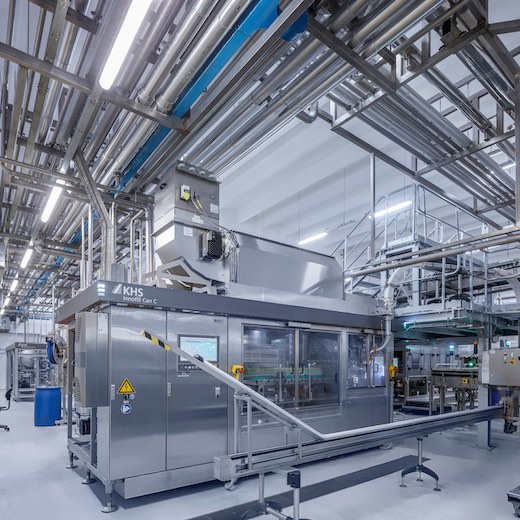Honoring the Past and Shaping the Future: Mattoni 1873 Mineral Water Brand Installs Complete Canning Line from KHS
Press release from the issuing company

Once one of the most famous mineral waters in the world, Mattoni 1873 has since firmly arrived in the 21st century. What’s more, as the biggest distributor of non-alcoholic beverages in Central Europe, it’s shaping the future regarding circularity – also with the help of high-tech from KHS.
Karlovy Vary in the Czech Republic is one of the best known and most traditional spa towns in the world. The healing properties of its springs have been exploited since the 15th century. During its boom in the 19th and early 20th centuries, together with towns such as Baden-Baden in Germany and Montecatini Terme in Italy what was then known as Carlsbad was a popular destination for the traveling and spa society of Europe. With their grand architecture and dazzling social and cultural events, these locations were key milestones in the early development of global tourism. It’s not without good reason, then, that in 2021 Karlovy Vary was made one of UNESCO’s eleven Great Spa Towns of Europe.
One of the spa’s most famous citizens was Heinrich Mattoni, who in 1873 laid the foundations for the mineral water spring named after him when he purchased the little spa town of Kyselka situated around ten kilometers downstream on the River Oh?e. Mattoni even had a separate railroad laid for the distribution of his water and by 1898 he was already selling approximately eight million bottles a year, all adorned with a label sporting the red eagle from his family coat of arms. The entrepreneur was subsequently made a peer by the Austrian emperor for his services.
Under the ownership of the Pasquale family from Italy since 1991, Mattoni 1873, as the brand is now called, is the largest distributor of soft drinks in Central Europe, with production sites in the Czech Republic, Hungary, Bulgaria, Austria and Serbia. The company attaches a great deal of importance to tradition: in Kyselka alone, three crumbling buildings have now been lovingly restored with great attention to detail and according to the guidelines regarding the preservation of historic monuments. One of them houses the Mattoni Museum. Another, Hotel Praha dating back to the 19th century, is now used as offices for the company’s IT department. In the same way that Mattoni 1873 has married old with new here, the enterprise presents itself in an extremely modern light while remaining loyal to its history, investing over €40 million in state-of-the-art technology for its various plants in the last three years alone.
Entrepreneur and NMWE president
The most recent acquisition is a turnkey canning line from KHS, on which mineral water is being filled into recyclable beverage cans for the very first time in the Czech Republic. Moreover, these are already made of around 70% recycled aluminum. “Our new, ultramodern system adds the final container category to our portfolio that has been lacking to date,” smiles executive president and company founder Alessandro Pasquale. “We can now supply the market for non-alcoholic beverages with all styles of beverage packaging. And we’re now also in the position to supply our home market with beverages from the licensed Pepsi portfolio more easily, whose canned products we previously had to bring in from outside the country.” Pasquale not only runs the family firm; he’s also the president of Natural Mineral Waters Europe or NMWE. In this capacity he not only wishes to make the Czech beverage industry circular and sustainable but also that of the entire European Union.
In addition to an Innofill Can C can filler with an output of up to 20,000 containers per hour, the new KHS line includes a palletizer and a depalletizer, a blending system, a tunnel pasteurizer and two shrink packers with and without trays. “All told, up to twelve different formats and a huge variety of products are processed on our machines,” says Lubomir Neubauer, area sales manager for the Czech Republic and Slovakia at KHS. “We’ve thus configured the system so that it gives the customer maximum flexibility. The Innofill Can C especially that, unlike the high-performance Innofill Can DVD can filler most commonly used to date caters for the medium capacity range, is the perfect choice here.”
Protecting natural springs and cutting emissions
The bottling plant chiefly produces flavored mineral waters in the Mattoni Imuno, Essence, Multi, Black and Cedrata ranges, plus beverages from the Pepsi portfolio and by other licensed brands that previously also had to be imported to the Czech Republic from Poland, for example. In this respect, the new investment is also a mark of progress when it comes to sustainability – a principle that Mattoni 1873 has consistently committed to. Besides protecting its springs, whose crystal-clear purity is to be maintained for future generations, the beverage bottler is extremely intent on cutting its emissions. Over ten years ago, for example, it restored the railroad track originally built solely for the company and in doing so reconnected the Kyselka facility up to the Czech railroad network. Since then, up to 80,000 pallets of goods have been transported by freight train a year, with well over 20,000 journeys by truck in total saved as a result – good for both the environment and for the general situation on the roads.
In line with the credo of the boss, first and foremost the group focuses on circularity. “We’ve been aiming for full circularity of all of our beverage packaging for a long time now,” explains company spokeswoman Lutfia Volfová. “We use returnable glass bottles, for instance, and try to have our PET bottles and beverage cans recycled locally.” To this end, the bottler has founded the zálohujme.cz initiative that campaigns for the introduction of a nationwide deposit system and of which Volfová is also spokesperson. “This measure would facilitate and promote container recycling, with the majority of the resources needed for manufacture of the primary raw materials, such as energy and water, and carbon emissions being saved.” Just like PET, recycled aluminum can be also perfectly reused as a material for beverage packaging, believes Volfová. “Before it can be fed back into the loop, however, we need to ensure an efficient return system.” In this respect, the initiative still has a way to go; at the moment, in the Czech Republic only three out of ten cans are collected.
Shared story of success
Mattoni 1873 and KHS have shared a bond for over 30 years now; since the Pasquales took the helm at the start of the 1990s, plenty of new equipment has been ordered from the Dortmund systems supplier – from a stretch blow molder for the plant in Moravia through Kisters packers in South Bohemia and a CombiKeg line for Pod?bradka mineral water from Central Bohemia to a bottle washing machine for the Pepsi bottling plant in Prague. For many years the two companies have also engaged in a regular close exchange of ideas and information on topics such as technological innovation, changes in consumer behavior, market developments and regulation.
Besides the trusting partnership between Mattoni 1873 and KHS and the positive response to comparable KHS reference projects on the market, the newcomer to the beverage can segment was primarily prompted to invest by the existence of a dedicated local KHS office, as Volfová states. “This allowed our specialists to actively communicate with the team at KHS on all levels at each phase in the project’s implementation. This was an extremely convincing argument for us – that our partners were able to react quickly and personally at all times without having to overcome any language barriers.” KHS’ local presence in the Czech Republic is assured by no fewer than 18 employees who are able to carry out layouting, installation and general commissioning, among other work, independently.
Including all additional costs for conversions, expansion of their warehousing capacity and various connections, Mattoni 1873 has spent more than €8.2 million on the new system that’s been up and running in three-shift operation since 2023. “The market significance in Central Europe and the group’s strong growth require that we further expand and modernize our production capacities. In the past three years we’ve concentrated most heavily on the roots of our company, the Karlovy Vary region and our plant in Kyselka, where the majority of our capital has been invested,” says Alessandro Pasquale. Company founder Heinrich Mattoni surely would have approved.
- Questions to ask about inkjet for corrugated packaging
- Can Chinese OEMs challenge Western manufacturers?
- The #1 Question When Selling Inkjet
- Integrator perspective on Konica Minolta printheads
- Surfing the Waves of Inkjet
- Kyocera Nixka talks inkjet integration trends
- B2B Customer Tours
- Keeping Inkjet Tickled Pink
© 2024 WhatTheyThink. All Rights Reserved.














